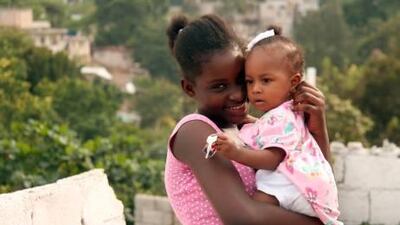She still suffers from back pain and mental anguish from being trapped under rubble when her home was flattened by Haiti's devastating earthquake, but Mendji Bahina Sanon seems quietly confident of a brighter future.
The 12-year-old fell under the international spotlight in January 2010, when she recounted to television crews from a hospital bed her ordeal of nine days stuck beneath debris without food or water.
A year later, Mendji - known to her friends as Fedora - told The National this week how her family has struggled to rebuild their lives.
"This past year has been really hard for us - I'm not happy about it," said Fedora. "I hope this coming year will be better. We need a break. I want the country to make progress, for people to get out of the tent camps. Mostly, I don't want any more earthquakes."
Fedora remembered thinking "Jesus was coming" when seismic tremors ripped through her Petionville family home and brought the ceiling down upon her and four siblings, including a five-year-old brother who died under a shower of concrete.
In television interviews, she told how she sobbed beneath the debris until she could not cry any more. Without food or water, she used whatever energy she could muster to thump a television in a desperate bid to attract attention.
Her mother, Ernste Clerge, 39, had given up Fedora for dead when, after nine days, neighbours digging for clothes heard her daughter's faint banging. After an 18-hour operation, an emaciated and dusty Fedora was pulled from the rubble.
"I feel very blessed because God has given me everything I asked for," she said. "I don't dream about it - I try not to even think about it. When I do think about it, I remember my little brother who died. So I just try to block it out."
Fedora's school grades are improving and she eventually wants to train as a paediatrician. But back pain leaves her struggling to carry schoolbooks on the hour-long walk to class and she has not received any counselling for post-traumatic stress syndrome.
"We don't have anything like that at school and nobody has asked me to talk about it," she said. "I tell my classmates, but they don't believe me. They can't understand how somebody could survive for nine days under the rubble without eating or drinking - it's unbelievable."
One year since the earthquake and Fedora's story is a reminder of how children are still suffering from the disaster. Some 750,000 youngsters were affected by the quake, says the UN agency for children, Unicef, in its report, Children in Haiti One Year After.
The 30-page document says children are "reeling from the lingering impact" of the earthquake as the country lunges from crisis to crisis, including tropical storms, a cholera outbreak and the political fallout from November's disputed election.
Children make up about 40 per cent of the 810,000 living in the tent cities that sprang up after the quake, where "shelter and services are still hardly sufficient for children to stay healthy, fulfil their right to education, remain protected and have access to safe water, sanitation and hygiene".
Camp children are at risk of violence, sex abuse and child trafficking, the UN says. Psychologists warn parents to monitor children for bed-wetting, nightmares, under-eating, smoking or drinking alcohol as symptoms of post-traumatic stress syndrome.
"I don't go out after dark," said Dadie Gallan, 11, who lives with family friends in a sprawling Port-au-Prince camp after her mother and brother left for the countryside. "My godmother also tells me not to play with the other children because they are not always clean."
Both the United Nations and Amnesty International have recorded worrying trends for girls in particular, as the number of rapes increases and they are easy prey for sex traffickers.
Adna Thomas, 43, a head-teacher at College Jean-Baptiste Nicolas, a Port-au-Prince school which was damaged by the quake and reopened last April, said enrolment numbers have dropped from 300 to 180 and that most of her pupils live in the squalid camps.
"Teaching is difficult now because the children are stressed and scared - they still run out of the classroom in fear when they hear a loud noise outside," Ms Thomas said. "Their families have difficulty paying school fees because pretty much everyone lost money in the earthquake."
"Some of these children are extremely vulnerable and we are concerned. Many do not have their parents looking out for them, and they face problems with violence, crime and even rape inside the camps."
One of the biggest challenges facing Haiti is rebuilding a shattered education system, where almost 4,000 schools were damaged or destroyed, 1,500 teachers and staff were killed and 2.5 million schoolchildren had their education interrupted.
"This anniversary, we're all confronted with big questions: has enough been done for Haiti, its people, and particularly its children? The answer is twofold: no, not yet — and, we must ramp up our work now," said Gary Shaye, the Haiti chief for the international aid group, Save the Children.
On the roof of her Petionville home, Fedora joked with her sisters and played with a neighbour's baby. The scars on her belly and thigh offer a grim reminder to the pain she endured last January.
Although her grades are improving, her mother, Ms Clerge warns that her daughter's future is in jeopardy because the family is likely to be evicted this week, unable to pay the US$2,500 (Dh9,175) needed to renew a six-month lease on their home.
"I'm stressed and looking everywhere for a place to live," she said. "But here, in this house, we are believers in the future. We don't think life is going to get worse. It's getting better. We just need to see our government working harder to make more positive changes for the future."


